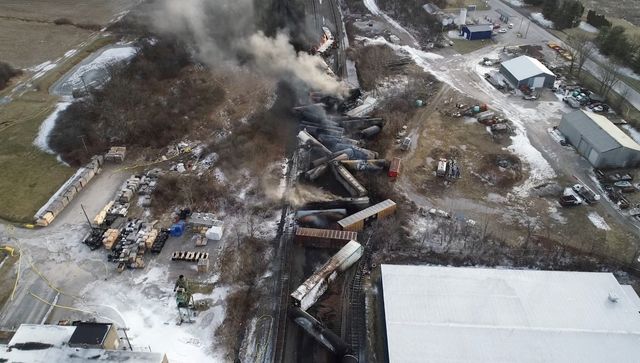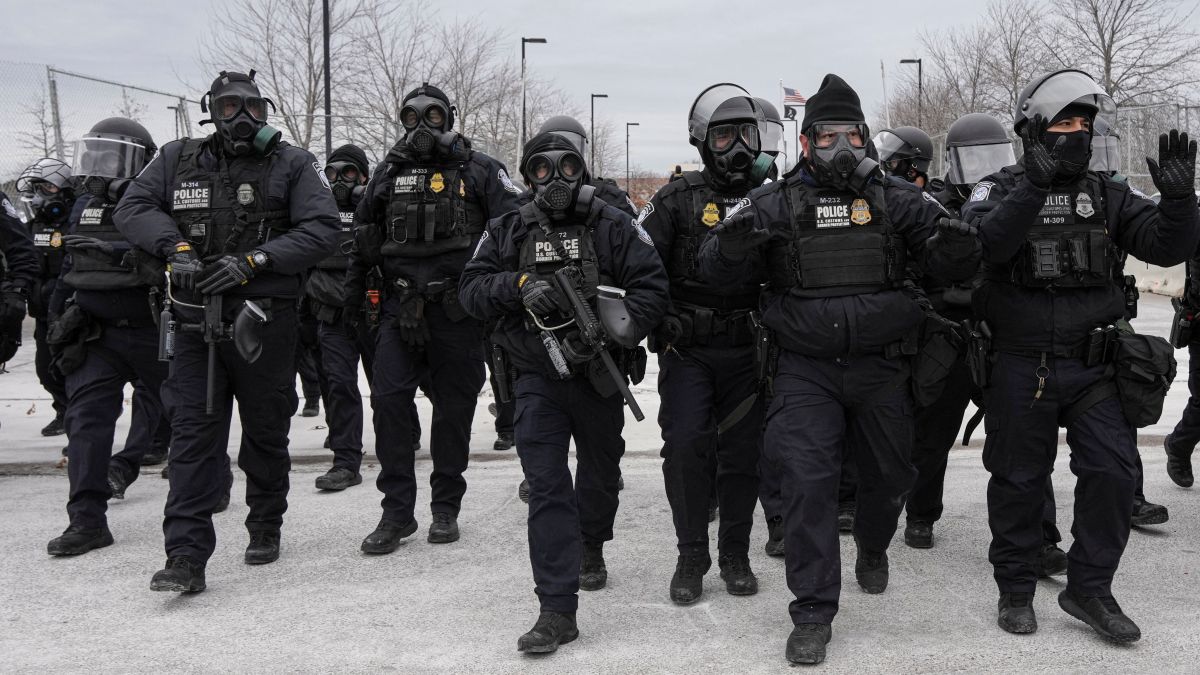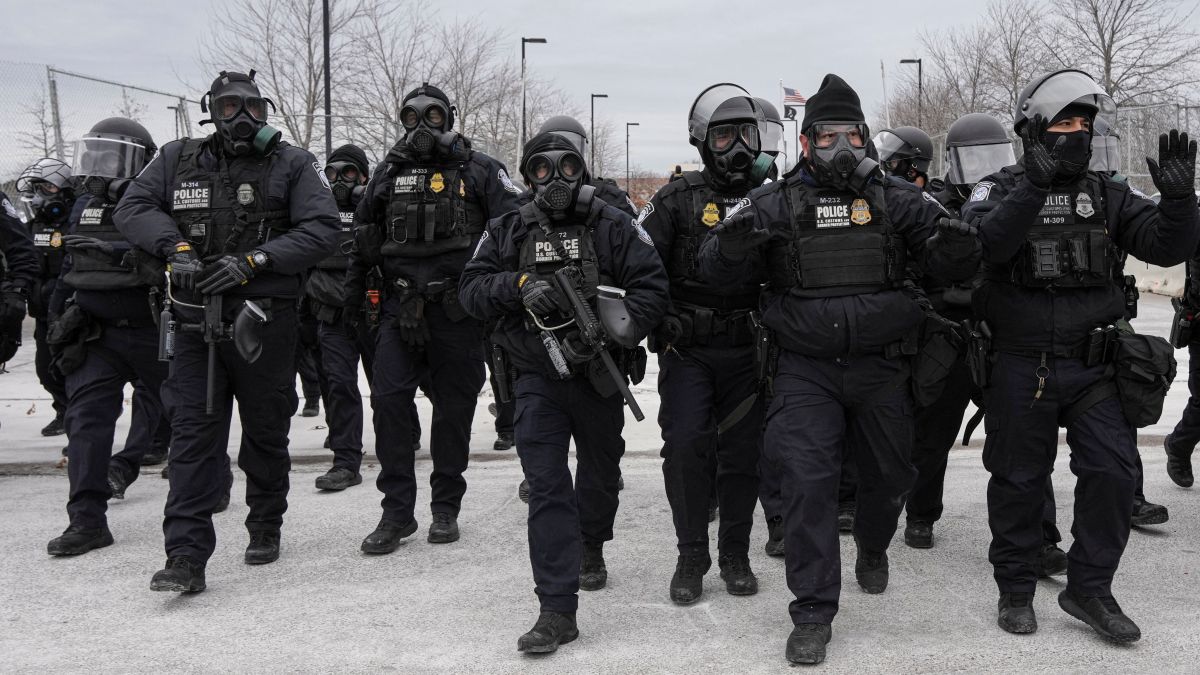It would have been comic, if not for its tragic and extremely dangerous consequences.
The Incident
On 3 February, at close to 9 pm, 38 of a total of 151 wagons of a freight train derailed in East Palestine, Ohio, United States. Twenty of the derailed wagons were carrying a range of hazardous toxic chemicals including vinyl chloride, which is a highly flammable, carcinogenic gas that can cause dizziness, headaches and drowsiness. The train, run by Norfolk Southern Corporation, had departed Madison on 1 February, and had suffered at least one mechanical failure before the derailment. This is according to the preliminary findings of an investigation, which has mostly concentrated on finding the causes of the derailment.
While several wagons burned for several days, about 100,000 gallons of hazardous materials got discharged at the accident site. Further, vinyl chloride was ‘controlled released’ to prevent an explosion. People, concerned of the contaminated air and ground water, left their homes. The spillage of hazardous material into several creeks, nearby storm drains and river; and the smoke from the burnt wagons consisting of hydrogen chloride and phosgene have reportedly claimed lives of over 43,000 animals. The impact on the air, soil, water, and humans living in the area are yet to be ascertained in clear terms. But the story indicates that the impact could indeed be long-term and potentially serious on the region’s small community. It won’t be an exaggeration to say that incidents of this nature could potentially turn out to be a mini Chernobyl 2.0, with grave consequences.
Slow-moving government machinery
The response of the state authorities and the US federal government to this environmental disaster has been tragically slow, riddled by polarized politics, and exposes a completely lackadaisical approach of the state towards people’s health issues. Worse still, a lack of official transparency could potentially mean that there are deliberate attempts being made by the authorities to hide critical information.
The fact that thousands of train wagons transport hazardous material across the length and breadth of the US through multiple states is not unknown. This system of transporting and disposing these chemicals are considered to be relatively safer than using other means, for instance use of trucks on roads. Similarly, the mostly private-owned train systems have a fairly long history of frequent accidents too is well documented. The 3 February accident was not even the first to have occurred in Ohio this year. Another derailment took place on 19 January between Trinway and Adam’s Mill. On that occasion, the 97 wagons which derailed were fortunately empty and hence, did not leak. 11 more derailments have taken place in other states this year, a report by Newsweek shows. American railroad and the challenges it faces, has for some reason, remain vastly under-reported.
Quick Reads
View AllYet, what remains disturbing in the Ohio derailment is the pathetically slow-moving machinery of government disaster response, when it gets caught in the complex layers of federal, state and local responsibility or the lack of it. Past investigations are hardly conclusive and few changes have been made to prevent such accidents. This time around can’t be expected to be any different.
Companies like Norfolk Southern rake billions of dollars every year. In 2022, the Corporation’s operating revenues were a record $12.7 billion, an increase of 14 per cent over 2021. Yet, these companies continue to operate on accident prone infrastructure. Regulation of railway networks by the federal authorities is weak. The maximum fine imposed on railway companies for violating safety regulations currently is mere $225,455. Repeated accidents demonstrate that this meagre fine is hardly a pressure when the company doesn’t choose to comply with the safety norms. It isn’t strange therefore that the Norfolk Southern officials did not even attend a town hall meeting in East Palestine following the derailment.
The politics
The US Department of Transportation Secretary Pete Buttigieg is now pushing for stronger rail regulation, safer train cars, and bigger fines for companies that break the rules. The response, however, is only reactionary and appears to be only a damage control exercise rather than pushing through any serious move to put things in order. Buttigieg had remained silent for several days after the accident, inviting criticism from his own party men as well as the Republicans.
The accident has also brought back attention to the policies scripted by successive US governments that paid scant regard to public safety and health concerns. To deflate criticism on President Joe Biden who chose to undertake a secret 10-hour train trip to Ukraine from Poland on 6 February, rather than visiting East Palestine, the US government has started publicizing the damaging impact of former president Donald Trump’s decisions to roll back a rule requiring high-hazard flammable trains to install electronically controlled brakes; also to reduce minimum number of crew on such trains etc.
While all these are true, the Biden administration, more than two years in office, has done very little to undo the damages brought about by Trump. Strangely, according to the existing trains classification laws, the Norfolk Southern train was not considered a high-hazard flammable train. Therefore, states through which such trains pass aren’t notified of the contents in the train, thereby limiting their response ability in case of an accident. Moreover, implementation of DOT 117 train cars, which use a shell thickness of 9/16 of an inch and insulating material providing thermal protection and thereby are designed to prevent the release of the car’s contents in an accident, will not be implemented until 2029.
As a result, former president Trump’s attempt to derive leverage out of the incident has been met with the Democrats trying to deride him in a tit-for-tat political drama. Politics and not so much concern about the impact of the spillage on the local community’s lives seem to be ruling the official response. The Biden administration has ordered Norfolk Southern to pay for ‘cleaning up the mess’ in Ohio. The resource rich NS will probably gladly do that and escape, until yet another accident, in Ohio or somewhere else, brings in a much bigger catastrophe.
Lessons for India
Accident of a similar nature is not unimaginable in India, as Indian Railways carries humongous amount of cargo on its tracks, which is increasing each passing year. From April 2022 to January 2023, from April – January 23, it transported materials weighing 1,243.46 metric tonnes. The national carrier is implementing the ‘hungry for cargo’ initiative to attract more business. The percentage of toxic chemicals in this cargo isn’t known. However, the possibility of an accident and spillover of toxic material is something that needs to be factored into the policies with private operators gradually entering the railways. The government has ruled out privatizing Indian Railways but has opened up routes on which private players can operate their own locomotives.
Relevant provisions of the Indian Railways Act, 1989, such as Chapter 9 dealing with ‘carrying of dangerous and offensive goods’ and Chapter 13 dealing with ‘liability due to accidents’ do not expressly deal with such exigencies. The centralized nature of Indian Railways and National Disaster Management Authority (NDMA) do address the Centre-state binary over such issues. However, given the fact that the state authorities could be the first responders, the quality of disaster response and management at the state level needs to be augmented. Lastly, a move towards spillage-proof carriages, similar to the DOT 117 variety, need to be initiated.
The writer is the Director of Mantraya, a Goa-based research forum and the author of ‘National Security Decision-making in India’. He formerly served as a Deputy Director in the National Security Council Secretariat. He tweets @BibhuRoutray and can be contacted at bibhuroutray@gmail.com. Views expressed are personal.
Read all the Latest News, Trending News, Cricket News, Bollywood News,
India News and Entertainment News here. Follow us on
Facebook,
Twitter and
Instagram.


)

)
)
)
)
)
)
)
)



